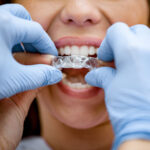Dentures & False Teeth
Tooth loss can lead to several concerns, including a marked impact on the ability to speak clearly, along with issues of self-esteem and confidence. The loss of one or more teeth can result in bone-regression in the jaw bone and over-closing which can, in turn, lead to the signs of premature ageing.
There are several solutions for tooth replacement. They can restore a smile, restore your bite and restore the way you feel about your smile when you look in the mirror.
Dentures are one of the smile restoration solutions that have been used reliably for many years and are also one of the more affordable ones.
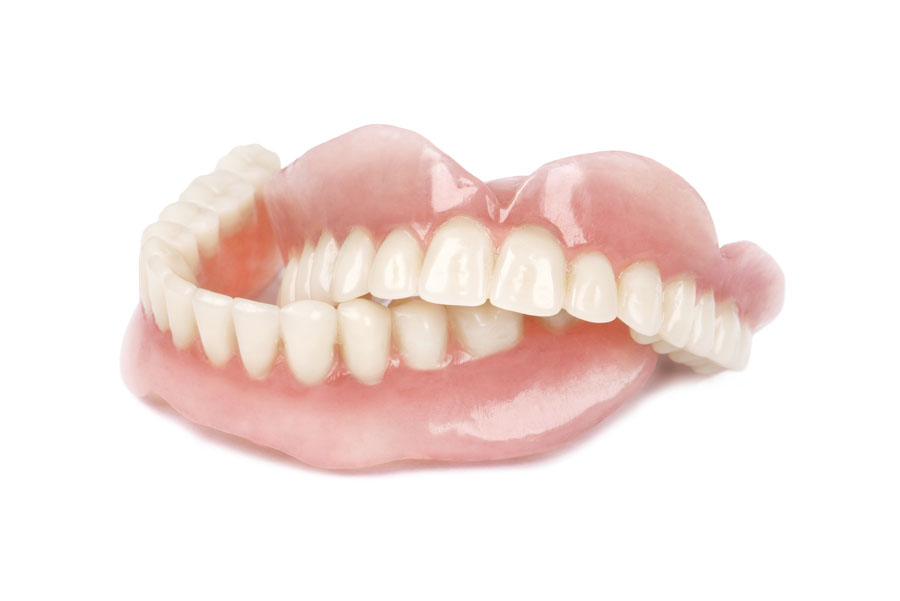

What are dentures?
Dentures are a dental prosthetic that is created to fit your mouth and gums, a uniquely fitting device. They are a minimally invasive option to replace teeth that have been lost or removed. Dentures come in full- where all teeth are missing- or partial options. This means that they can replace all of the teeth on the top or bottom of your mouth or replace just a few teeth that are missing whilst maintaining your remaining natural teeth.
The flesh-toned bases and artificial teeth of the prosthesis will look no different than your natural teeth once they are in place. They can be set up to look like an even row of teeth with distinct features to look more masculine or feminine. Equally, the can be set up to look crowded or crooked. They can even be matched to a picture of your natural teeth.
There have been several advances in denture technology over recent years. The result for denture wearers today means natural looking and comfortable fitting prosthesis that restores the ability to laugh, smile, talk and eat.
There are a number of options in materials for dentures. Today’s denture bases are made from durable acrylic resin or a combination of metal and durable resin. The teeth of the dentures are made from a natural-looking acrylic usually.
The type of dentures that are the ideal option for you will be dependent on several factors unique to your oral health care needs. Your dentist will carefully discuss all of your available options with you.
There are two types of denture offered: complete and partial dentures. The type of dentures that each patient will need will be based upon the number of teeth that need to be replaced and based on oral health.
Further options in dentures include implant retained removable dentures. The implants are attached to your jaw bone and project into your mouth. The denture clicks onto the head of the implant and is ultra-secure however it is still possible and necessary to remove the denture at night time.
Both partial and full dentures feature a flesh-toned base and beautifully natural-looking teeth. The colour of the teeth on partials can be matched to your remaining natural teeth so that you are afforded a wholly natural look.
Full dentures are used to replace the full set of teeth on your upper or lower jaw, or perhaps both upper and lower. They are an ideal solution to consider if you have no remaining healthy teeth. Any remaining teeth will need to be extracted prior to fitting these dentures.
Implant-supported dentures are a good compromise for those looking for a more permanent smile restoration solution. Full implants are a good option but not always the right budget-friendly option for all patients. Combining strategically placed implants and dentures allow patients to get the benefits of both.
The type of dentures that will best meet your needs will be based upon a number of individual oral health factors. Consulting with your dentist will help to ensure that you get the best treatment to meet your needs.
Dentures not only work to improve the aesthetics of a smile that is missing multiple teeth, but they also help to ensure there is solid support around the lips and the cheeks.
For many patients, one of the more attractive features about dentures is that they can often work out to be a more cost-effective option for those who are missing many of the teeth from their upper and lower gums.
Certainly, dental implants are a great option to consider, but they can prove to be a costlier option for those who are missing a large number of their teeth.
Implant-supported dentures, also know as all-on-4 are one option for patients who are interested in dentures that are fixed in place. During your consultation, you should be sure to discuss your smile restoration goals with your dentist so that you can select the right option to meet your needs.
Both removable and fixed dentures can restore the ability to speak clearly without impediment, as well as restore the smile that has for long been hidden in shame.
With good care, dentures can last for many years.

How much do dentures cost?
If you are looking for the highest quality dentures, to the best design for you and at an affordable price then you’ve come to the right place. At Cork City Dentist we offer a selection of dental services and treatments at competitive prices, to meet the needs of our patients.
To learn more about what we can offer, review our pricing list below. Then call or book an appointment online to get started.
| Treatment | Price |
|---|---|
| Tooth whitening | €300 |
| Crowns (dependant on type) | from €700 |
| Porcelain veneers | from €700 |
| Dental Bridges | €700 per unit |
| Inlays & Onlays | from €500 |
| Dentures - Partial acrylic (plastic) | €550 - €650 |
| Dentures - Partial cobalt (metal base) | €1400 |
| Dentures - Full upper | €550 |
| Dentures - Full upper and lower | €1200 |
| Dental Implants - Crown | €1200 (+specialist fee for surgical treatment) |
Are you looking to restore your smile with dentures made just for you? At Cork City Dentist our friendly staff are here to help you in a calm relaxed.
To find out more about full permanent dentures or partial dentures, you can book an appointment online or call the clinic at 0214501306
Other Treatments
Contact Us
Other Treatments you may consider

Dental Veneers
Preventing small dental issues from flaring up into much more severe health problems is possible when you maintain a good check-up routine with our dentist. Both a check-up and consultation for additional dental services and treatments can help you to ensure proper oral health.
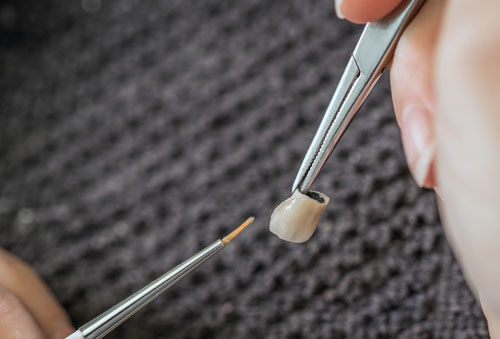
Dental Crowns
A dental crown is a prosthetic/artificial piece that fits over a natural tooth after it has been restored or repaired. Some people refer to crowns as caps because they fit your tooth like a cap fits your head. Therefore the remaining natural tooth is enclosed and protected from fracture. Crowns can strengthen the natural tooth while also giving you an aesthetic restoration, which can restore a smile.

Composite Bonding
Bonding consists in the application of composite resin on dental surfaces to repair decayed, chipped or misaligned teeth. Composite resin has the advantage of being aesthetic, reasonably priced and very mouldable.. It is shaped and polished according to the characteristics of the surrounding teeth.
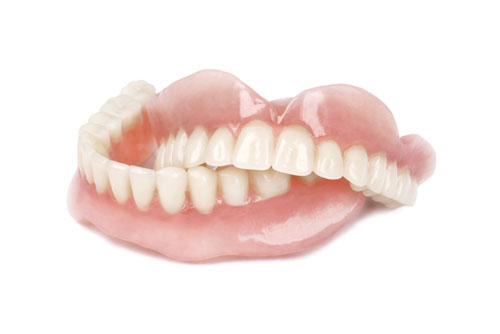
Dentures & False Teeth
Tooth loss can lead to several concerns, including a marked impact on the ability to speak clearly, along with issues of self-esteem and confidence. The loss of one or more teeth can result in bone-regression in the jaw bone and over-closing which can, in turn, lead to the signs of premature ageing.

Dental Bridges
Simply put, a dental bridge will bridge the gap that was created by the missing tooth or teeth. The bridge will be fixed to the healthy teeth on either side of the gap. These teeth may need to be capped with a crown to reinforce them or can just have a ‘wing’ of bridge material on the palate or tongue facing side.
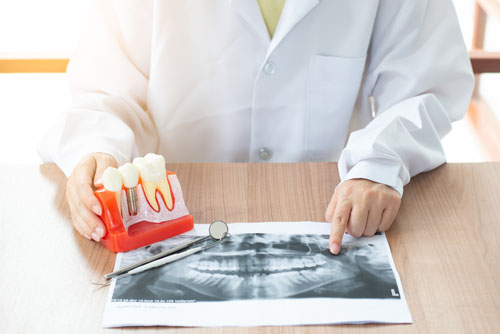
Dental Implants
Advances in dental care mean that more people are expected to retain their natural teeth for longer. There are, however, many who are currently missing teeth in their upper and lower jaws. Whether you have lost one or more teeth as the result of decay or injury, gaps between your otherwise healthy teeth can lead to several oral health concerns.
Frequently Asked Questions
Dentures are a removable way to replace missing teeth. They may be used for one missing tooth or all the teeth and any amount of missing teeth in between. Dentures that replace an entire arch of teeth are usually called ‘full’ dentures and dentures that replace some teeth are called partial dentures.
Dentures are usually made from pink acrylic and the teeth nowadays are also acrylic. The denture may have a metal base called cobalt chrome which can clip onto natural teeth making the denture more steady in the mouth. ‘Valplast’ acrylic dentures are a more flexible type of material suitable in some areas of the mouth. Previously teeth were made from porcelain however it is now felt that porcelain may be too rigid and transmit too much force to the underlying bone on removable dentures.
Most all dentists do dentures. If a case is especially difficult there are dentist denture specialists called prosthodontists who accept referrals.
Dentures take anywhere from two to four visits usually with a week between each visit to allow for laboratory turnaround. Occasionally more complicated laboratory procedures like cobalt chrome fabrication will take a little longer.
Pricing depends on the material used and teeth missing. A full set of dentures with all teeth missing could be expected to cost approximately 900euro- 450 upper, 450 lower. Partial dentures vary from 250 to 450 for acrylic and 900 to 1100 for cobalt chrome. Dentures that are supported by implants vary dramatically depending on the type and number of implants and are priced on a case by case basis.
False teeth should be removed at night time as they are a great place to grow fungus! Underneath is warm, moist and dark and candida otherwise known as thrush will grow on the gum and denture. The denture should be removed and obvious food deposits rinsed off. Normal toothpaste is too abrasive for denture surfaces and shouldn’t be used. Liquid soap or washing up liquid is better, used with a soft toothbrush and obviously should be well rinsed off after!
Alternatively, there are products like denture crème available in the pharmacy or supermarket. For acrylic dentures, one of the best ways of storing it overnight is in a glass of water and a small drop of Milton sterilizing fluid. For dentures with any metallic element, the Milton will be corrosive and a product like steradent tabs can be used. If you get some yellow tartar buildup on your dentures the dentist can remove it at your check-up. Ideally do not store your denture in tissue as we have someone every week attending as they have thrown out their dentures accidentally. If you have to pack your dentures or spare dentures we can provide you with a ventilated box.
Dentures should sit comfortably against your teeth and gums without putting too much pressure on either. They should also be easily removable without excessive force. Initially, dentures certainly take a bit of getting used to and several adjustment appointments to get things just right are the norm. Sore spots should be reported and will be attended to. For the first week, speech may be affected especially the sibilant sounds like s and sh- also known as hissing sounds.
Excess salivation is also common initially and both these problems go away themselves. Some dentures are naturally more stable than others depending on the condition of the bone and teeth remaining. Cobalt chrome dentures or implant-supported denture are very solid in your mouth. The vast majority of people can eat a healthy and varied diet minus the tough steaks and toffees.
Dentures last according to the mileage they get and the material they are made from. Well looked after dentures, removed at night with a non-abrasive diet will last for ten years easily with cobalt chrome dentures being especially resilient. Interestingly major changes in your body can have an effect on the fit of your dentures, for example, dramatic weight loss. The bone supporting your denture will also mature and change over time. Regular check-ups are important even for people with no teeth to check the condition of dentures and their supporting structures.
Dentures can usually be repaired at Maccurtain Street including those broken in half. They may have to be left overnight on occasion depending on the degree of the problem but usually can be collected later in the evening if dropped in the morning. Often an impression of your mouth will be required similar to when you got the dentures initially.
Dentures broken in half are usually being flexed by a poor bite. Denture teeth cannot be whitened beyond cleaning off the surface stain. If dentures are still a good fit then the teeth only can be replaced for a whiter shade whilst retaining the base.
Meet The Team
We have a Fantastic group of highly trained, friendly dental staff to ensure you get the best treatment in Cork.
Get in Touch with us Today
Please call or email us via the contact form and we respond to you as soon as possible.
Contact Info
Phone: (021) 450 1306 / (021) 450 1250
Email: [email protected]



